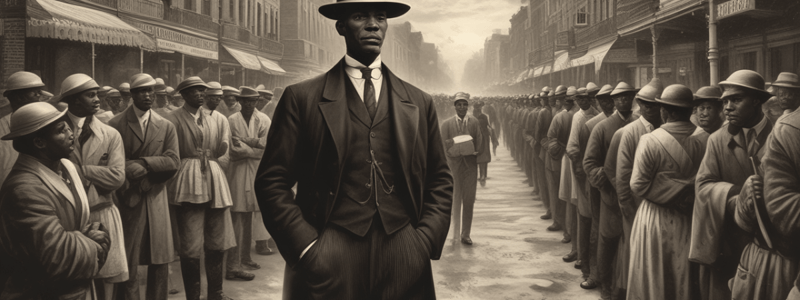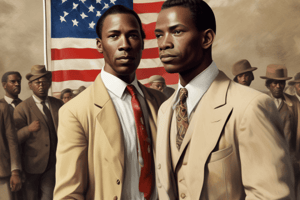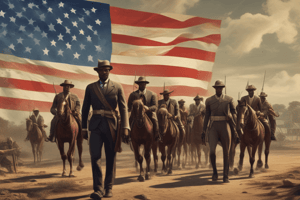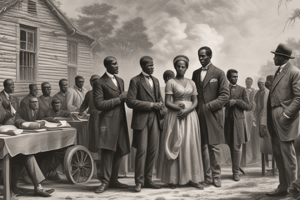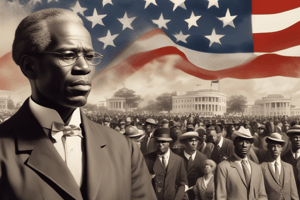Podcast
Questions and Answers
What was the primary purpose of the Freedmen's Bureau established in 1865?
What was the primary purpose of the Freedmen's Bureau established in 1865?
- To enforce segregation in the Southern United States
- To grant citizenship to African Americans
- To ensure a stable labor supply in the South
- To provide assistance to formerly enslaved African Americans and poor whites in the South (correct)
Which amendment to the US Constitution prohibited the denial of voting rights based on race, color, or previous condition of servitude?
Which amendment to the US Constitution prohibited the denial of voting rights based on race, color, or previous condition of servitude?
- 15th Amendment (correct)
- 14th Amendment
- 13th Amendment
- 24th Amendment
What was the main purpose of Black Codes passed by Southern states after the Civil War?
What was the main purpose of Black Codes passed by Southern states after the Civil War?
- To abolish slavery in the United States
- To grant citizenship to African Americans
- To restrict the freedom of African Americans and ensure a stable labor supply (correct)
- To provide education to African Americans
What was the primary purpose of poll taxes in the United States?
What was the primary purpose of poll taxes in the United States?
How were literacy tests often used during the Reconstruction Era?
How were literacy tests often used during the Reconstruction Era?
What was the primary purpose of Jim Crow Laws in the Southern United States?
What was the primary purpose of Jim Crow Laws in the Southern United States?
What was the result of segregation in the United States after the abolition of slavery?
What was the result of segregation in the United States after the abolition of slavery?
In what year was the poll tax finally outlawed in the United States?
In what year was the poll tax finally outlawed in the United States?
Study Notes
Reconstruction Era
- The Freedmen's Bureau was established in 1865 to provide assistance to formerly enslaved African Americans and poor whites in the South with basic needs such as food, housing, education, and employment.
Reconstruction Amendments
- 13th Amendment (1865): Abolished slavery in the United States.
- 14th Amendment (1868): Granted citizenship and equal protection under the law to all persons born or naturalized in the United States.
- 15th Amendment (1870): Prohibited the denial of voting rights based on race, color, or previous condition of servitude.
Economic Exploitation
- Sharecropping: A system where landless farmers, often African Americans, worked on land owned by others in exchange for a share of the crops produced.
Racial Oppression
- Black Codes: Laws passed by Southern states after the Civil War to restrict the freedom of African Americans and ensure a stable labor supply.
- Poll Taxes: A monetary fee or tax levied on individuals to be eligible to vote in an election, disproportionately used to disenfranchise African Americans from voting in the United States until outlawed in 1964.
- Literacy Tests: Used to keep people of color and poor whites from voting, administered at the discretion of voter registration officials.
Segregation
- Jim Crow Laws: State and local laws enforcing racial segregation in the Southern United States.
- Segregation: The practice of requiring separate housing, education, and other services for people of color, made law several times in 19th- and 20th-century America.
- Plessy vs. Ferguson (1896): A landmark Supreme Court case that upheld the constitutionality of racial segregation under the 'separate but equal' doctrine.
End of Reconstruction
- Compromise of 1877: An informal agreement that ended the Reconstruction era, resulting in the withdrawal of federal troops from the South and the election of Rutherford B. Hayes as President.
Studying That Suits You
Use AI to generate personalized quizzes and flashcards to suit your learning preferences.
Description
Learn about the Reconstruction Era in the United States, including the Freedmen's Bureau, Reconstruction Amendments, and more. Discover how the 13th, 14th, and 15th Amendments shaped American history.
